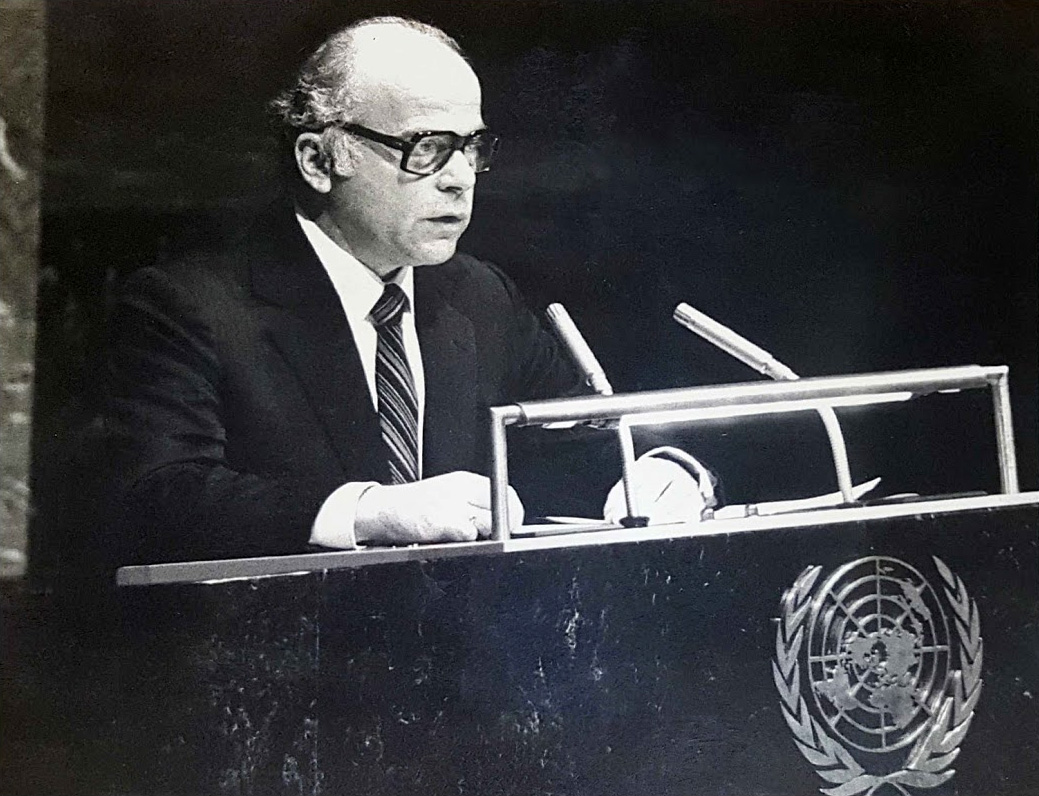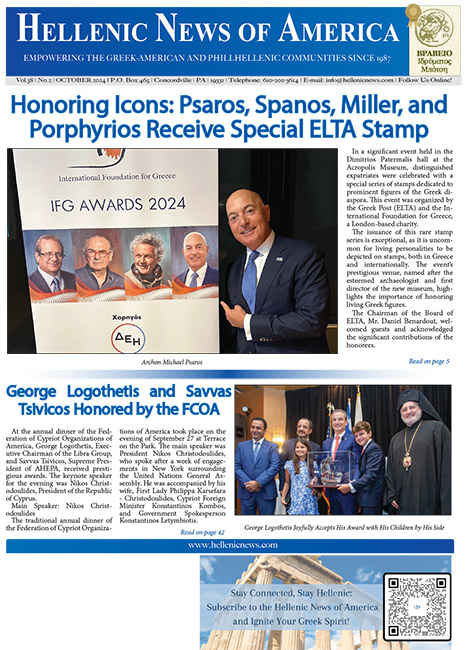Caption: Nicos A. Rolandis addresses the United Nations General Assembly on 24th September 1981. There were many recourses against Turkey in those years.
A SHADOW OF DEATH
The Treaty of Guarantee and the Treaty of Alliance were signed on the 16 th August
1960, together with the Treaty of Establishment of the Republic of Cyprus. In
accordance with Article 181 of the Constitution the two Treaties “shall have
constitutional force”, whilst Article 182 provides that they are basic articles of the
Constitution and “cannot in any way be amended whether by way of variation
addition or repeal”. The said Treaties were signed by the Republic of Cyprus, the
Kingdom of Greece and the Republic of Turkey. The United Kingdom signed only
the Treaty of Guarantee.
Article IV of the Treaty of Guarantee provides that in the event of breach of the
provisions of the Treaty and “if common or concerted action may not prove
possible, each of the Guaranteeing Powers reserves the right to take action with
the sole aim of re-establishing the state of affairs created by the present Treaty”.
Article IV of the Treaty of Alliance creates ELDYK (Greek Force) and TURDYK
(Turkish Force), which “undertake to resist any attack or aggression, direct or
indirect, directed against the independence or the territorial integrity of the
Republic of Cyprus”.
In brief, in 1959 the glorious but poorly programmed 1955-59 struggle of Cyprus
ended. The youth of Cyprus fought and sacrificed themselves, with unparalleled
courage, for union with Greece and liberty. Things however turned sour. It
became clear that we were heading for partition or complete catastrophe. So we
accepted, with our own signature, the “crippled” independence of 1960, which had
two serious drawbacks:
The Turkish Cypriots were upgraded from “minority” to “community” with
safeguarded strong rights and veto rights.
The Turkish army landed on the soil of Cyprus for the first time in almost a
century, on the basis of strong Treaties.
So, we created a “shadow of death” hanging, like a Damocles sword, over our
heads, in order to avoid actual death.
From 1960 to 1974 neither the Greek nor the Turkish Cypriots ran their affairs in a
correct and wise manner. Gradually we all demolished the Republic of Cyprus, up
until the coup d’ etat of 1974, when the Greeks dealt the final coup de grace. So,
the ground was paved for the 1960 Treaties and the Turkish invasion.
In March 1978 I was appointed Minister of Foreign Affairs. In those years we had
quite a number of recourses to the UN General Assembly for the condemnation of
the Turkish invasion and occupation. I headed the Cyprus Delegation and I also
had with me Glafcos Clerides (DISY), Ezekias Papaioannou (AKEL), Alecos
Michaelides or Alexis Galanos (DIKO) and Vasos Lyssarides (EDEK). Things
were not easy at all.
Our strong position was, inter alia, that the invasion was in breach of Article 2 (4)
of the UN Charter; that the phrase “will take action” in the Treaty of Guarantee
meant political, not military action; that the guarantor powers, if they had any rights
(which we denied), were to restore constitutional order and not to occupy Cyprus.
The Turks retorted that once the United Nations had admitted Cyprus as a
member they automatically accepted the 1960 Treaties, which are part of the
Cyprus Constitution; that the “action” could only mean military action, hence the
creation of ELDYK and TURDYK; and if the objective was only the restoration of
constitutional order, then they should occupy the whole of Cyprus which would
enable them to place the coup d’ etat under control and achieve the restoration.
The Turks also referred repeatedly to the Security Council speech of Makarios on
the 19 th July 1974, in which he had described, in many parts of the text, the coup d’
etat as “a Greek invasion against Cyprus, the consequences of which affect the
whole population, Greeks and Turks”. “So, if Greece invaded Cyprus and the
Turks of Cyprus were in danger, according to Makarios, what should we do?” the
Turks argued.
The arguments and the counter-arguments were endless. The bottomline was
that the international community, after considering in depth our problem, never
accepted entirely our positions. This is reflected in the tepid resolutions secured
by us during the 43 years, from 1974 until today:
Nicos Anastasiades took the presidency baton at a very difficult moment. In the
field of the economy he took over a scorched earth and he managed to revivify it.
In regard to the Cyprus problem – 40 years after 1974 – the “solution-train” had
already departed from the station. He had to start running after it.
The President, in co-operation with the Greek Government, tried to erase the
“Shadow of Death”, the 1960 Treaties. Unfortunately however, the Treaties are
very deep-rooted and they constitute Basic Articles of the Cyprus Constitution. A
unilateral labelling of the Treaties as anachronistic does not lead anywhere.
Furthermore, such a stand might be exploited by Turkey, which might, on the basis
of this rationale, write off unilaterally the Lausanne Treaty of 1923 as anachronistic
and invade the Aegean islands.
All the UN Secretaries-General have been very cautious on the issue of the Army
and the Guarantees. None of them ever suggested instant abolition. The same
stand was taken by the Cyprus Governments over the years.
Antonio Guterres took up this matter in a serious manner. In his Plan of July 4
2017, he proposes “the end of unilateral right of intervention and the end of the
Treaty of Guarantee”. On the other hand, he does not propose an end of the
Treaty of Alliance, on the basis of which ELDYK and TURDYK may take military
action. So, some uncertainty is created. He suggests a “rapid reduction of the
troops to low level and then to the 1960 level” (950 and 650 soldiers respectively)
and discussion at the highest level, of the question of whether and when they will
depart.
On the 18 th December 2015, I was invited with my wife Lelia and two friends for
dinner by my old friend Mustafa Akinci. On that occasion I had a private, unofficial
talk of 10-15 minutes with him.
On the question of the guarantees and the army he told me in a very clear
language that an instant and absolute abolition is ruled out both by Ankara and by
himself. I discussed the subject with him and I concluded that Mustafa might
possibly be prepared to discuss the matter along the following lines:
- The Turkish troops to depart gradually In 1-2 years (40,000 soldiers)
- ELDYK and TURDYK to stay, for an initial period of 12 years, with 1000
soldiers each, in separate camps in their respective states.
- UNFICYP to stay also with 1000 soldiers, as long as ELDYK and TURDYK
stay.
- In case of serious violation of peace and security in one of the two states
the respective force to intervene in order to restore peace and order.
- ELDYK will only be entitled to intervene in the Greek Cypriot state and
TURDYK only in the Turkish Cypriot state.
- If and when ELDYK or TURDYK intervene UNFICYP will also intervene for
the protection of the citizens of the other community who live there.
- After the 12-year period ELDYK and TURDYK will depart, provided that the
Security Council will so decide. The Security Council will be meeting every
year for this purpose.
- Irrespective of paragraphs 2 and 7 above, ELDYK and TURDYK will depart
if and when Turkey accedes to the European Union.
I do not know whether Mustafa is still prepared to discuss the above. I do not
know Nicos’ position either. What I do know is that if there is no solution, both the
Treaties and the “shadow of death” will be a permanent menace hanging over our
heads.
And a final point: Our security and our future will not depend solely on Treaties
but on our wisdom as well. We are small and weak. Turkey is a mighty,
unpredictable and dangerous country. Whether there are treaties or not, Turkey
may invade again if the events of 1974 (coup d’ etat), or something similar, re-
occur. This is what other mighty countries in the world have done in the past and
are still doing in their own affairs.
shadow_of_death.doc








